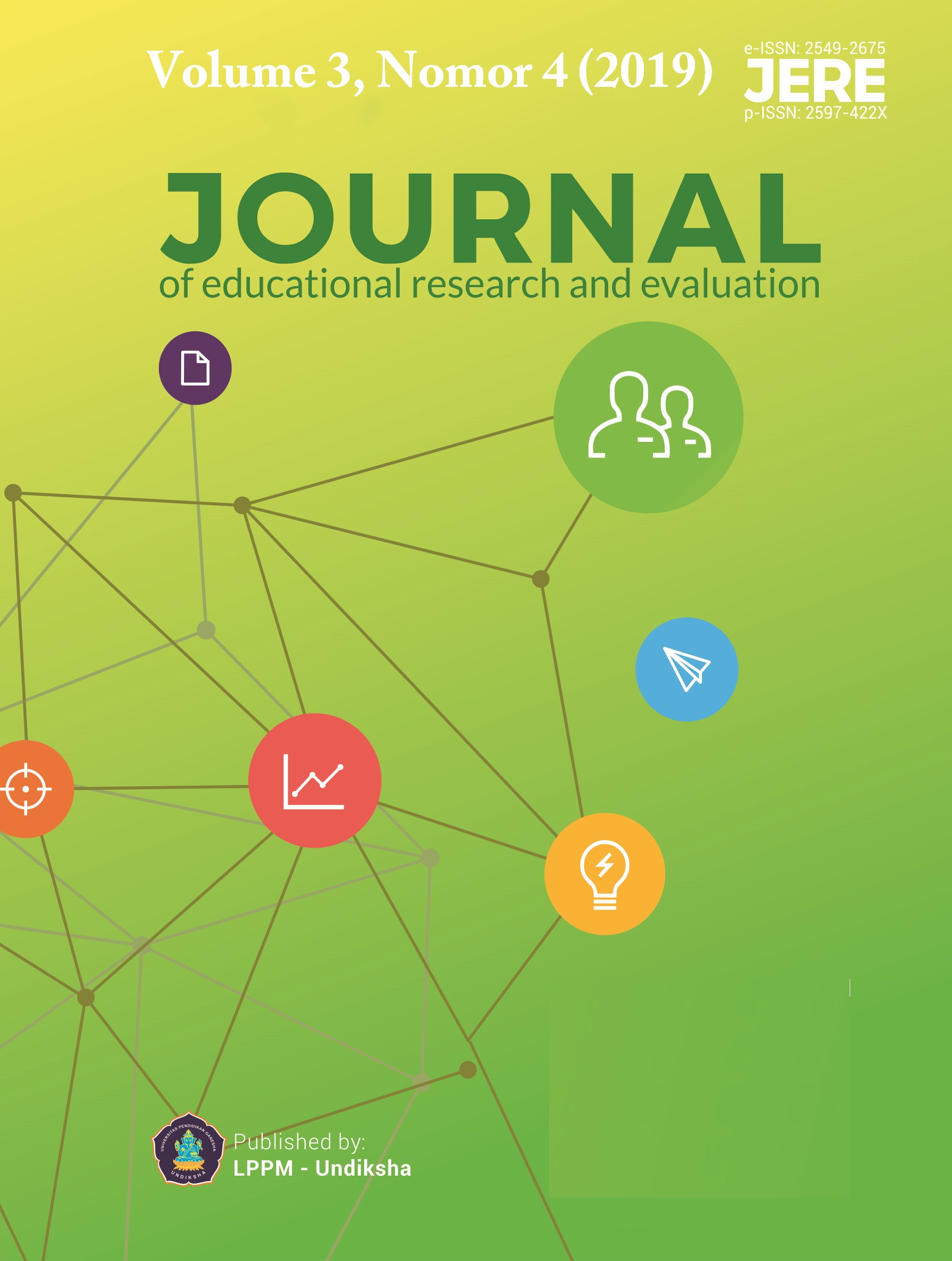The Validity Development of Adobe Flash Based Learning Media at Energy Conversion Machine Course in Vocational Education Programs
DOI:
https://doi.org/10.23887/jere.v3i4.22909Keywords:
Energy Conversion Machine, Learning Tools, ValidityAbstract
Learning outcomes of Diploma 3 students of Mechanical Engineering in the Energy Conversion Engineering course seem not optimal, it estimated that the learning outcomes were not optimal due to the inaccurate use of learning media in the learning process. The purpose of this study was to produce a valid adobe flash based learning media.This research was Research and Development (R&D) method with ADDIE model. The research subjects were students of the Diploma 3 Mechanical Engineering who took Energy Conversion Engineering courses. Data collect in the form of questionnaire sheets and primary data were obtained from lecturers and students. Data were analyzed by descriptive analysis technique by describing validity of adobe flash based learning media. Based on the analysis of the data obtained the validity of adobe flash based learning media, declared valid on the Content aspect with score 0,85 and the Display aspect with score 0,91. Based on the findings of this study it was concluded that the adobe flash based learning media was valid as a learning media in the Energy Conversion Machine course.
References
Andi Pramono dan Muhammad Syafii. 2016. Kolaborasi Flash, Dreamweaver dan PHPuntuk Aplikasi Website. Jakarta: Areli.
Artanto Widhiya. 2011. “Pengembangan Bahan Belajar Berbasis Audio Visual”. Tesis. Digital Repository Unila.
Bambang Warsita. 2011. Pendidikan Jarak Jauh: Perancangan, Pengembangan, Implementasi dan Evaluasi Diklat. Bandung: PT Remaja Rosdakarya.
Dewantara. 2014. “Pengembangan Animasi Flash dan Soal Interaktif Berbasis Power Point pada Materi Sistem Pernapasan Manusia Kelas XI”. Tesis. Digital Repository Unila.
Elsa Novyanti. 2014. “Pengembangan Media Pembelajaran Menggunakan Adobe Flash dan Autoplay Media Studio dalam Pembelajaran yang Berbasis Inquiry pada Materi Garis dan Sudut Kelas VII SMP”. Tesis. Universitas Jambi.
Ghaznavi, M. R., Keikha, A. and Yaghoubi, N. M. 2011. The Impact of Information and Communication Technology (ICT) on Educational Improvement. International Education Studies,4(2), 116-125. https://doi.org/10.5539/Ies.v4n2p116.
Giriyanti. 2011. Pemanfaatan Animasi Flash Sebagai Media. Diakses Rabu 2 September 2019.
Kusuma Pranoto. 2015. "Pengaruh Macromedia Flash Terhadap Hasil Belajar Siswa Kelas X IPA SMA Negeri 4 Pasuruan". Tesis. Universitas Muhammadiyah Malang.
Lewin, C. and Mcnicol, S. 2015. Supporting The Development of 21st Century Skills Through ICT. KEYCIT 2014: Key Competencies in Informatics and ICT, 98-181.
Melda Subri. 2016. “Pengembangan Media Pembelajaran Berbasis Adobe Flash CS3 dalam Mata Pelajaran Teknologi Informasi dan Komunikasi di Kelas XI SMAN 16 Padang”. Tesis. PPS FT-UNP.
Nana Sudjana dan Ahmad Rivai. 2011. Media Pengajaran (Penggunaan dan Pembuatannya). Bandung: Sinar Baru Algensindo Offset.
Nieveen, N., Mckenney, S and Akker, J.V.D. 2006. Educational Design Research: The Value of Variety. Dalam Akker, J.V.D., Gravemeijer, K., Mckenney, S. & Nieveen, N (Eds.). Educational Design Research (hlm. 144-184). Enchede: Axis Media-Ontwerpens.
Noor-Ul-Amin, S. 2013. An Effective Use of ICT for Education and Learning By Drawing on Worldwide Knowledge, Research and Experience: ICT As A Change Agent for Education. International Journal of Scientific & Technology Research, 2(9), 1-13. https://doi.org/6th August 2016.
Novrizen Eri. 2016. “Pengembangan Multimedia Interaktif Berbasis Adobe Flash pada Pelajaran Instalasi Jaringan LAN di Sekolah Menengah Kejuruan”. Tesis. PPS FT-UNP.
Nurhayati. 2017. “Pengembangan Media Pembelajaran Interaktif Berbasis Animasi Flash untuk Meningkatkan Keterampilan Berpikir Kritis Siswa pada Materi Sistem Respirasi Manusia”. Tesis. Universitas Lampung.
Nursalam. 2013. Metodologi Penelitian Ilmu Keperawatan: Pendekatan Praktis. Jakarta: Salembamedika.
Nusa Putra. 2012. Research & Development, Penelitian dan Pengembangan: Satuan Pengantar. Jakarta: PT. Raja Grafindo Persada.
Oemar Hamalik. 2013. Proses Belajar Mengajar. Jakarta: PT Bumi Aksara.
Saifuddin Azwar. 2015. Metode Penelitian. Yogyakarta: Pustaka Pelajar.
Sri Ratu Rahayu. 2017. “Pengembangan Media Pembelajaran Berbasis Android Menggunakan Adobe Flash CS6 untuk Mata Pelajaran Matematika”. Tesis. PPS FT-UNP.
Sugiyono. 2015. Metode Penelitian Pendidikan: Pendekatan Kuantitatif, Kualitatif dan R&D. Bandung: Alfabeta.
Suharsimi Arikunto. 2010. Prosedur Penelitian Suatu Pendekatan Praktik. Rineka Cipta Jakarta.
Tata Usaha Jurusan D3 Teknik Mesin FT-UNP. 2019. Padang.
Zainal Arifin dan Adhi Setiyawan. 2012. Pengembangan Pembelajaran Aktif dengan ICT. Yogyakarta: Skripta Media Creative.s
Downloads
How to Cite
Issue
Section
License
Authors who publish with the Journal of Evaluation and Research in Education (JERE) agree to the following terms:
- Authors retain copyright and grant the journal the right of first publication with the work simultaneously licensed under a Creative Commons Attribution License (CC BY-SA 4.0) that allows others to share the work with an acknowledgment of the work's authorship and initial publication in this journal.
- Authors are able to enter into separate, additional contractual arrangements for the non-exclusive distribution of the journal's published version of the work (e.g., post it to an institutional repository or publish it in a book), with an acknowledgment of its initial publication in this journal.
- Authors are permitted and encouraged to post their work online (e.g., in institutional repositories or on their website) prior to and during the submission process, as it can lead to productive exchanges, as well as earlier and greater citation of published work. (See The Effect of Open Access)











